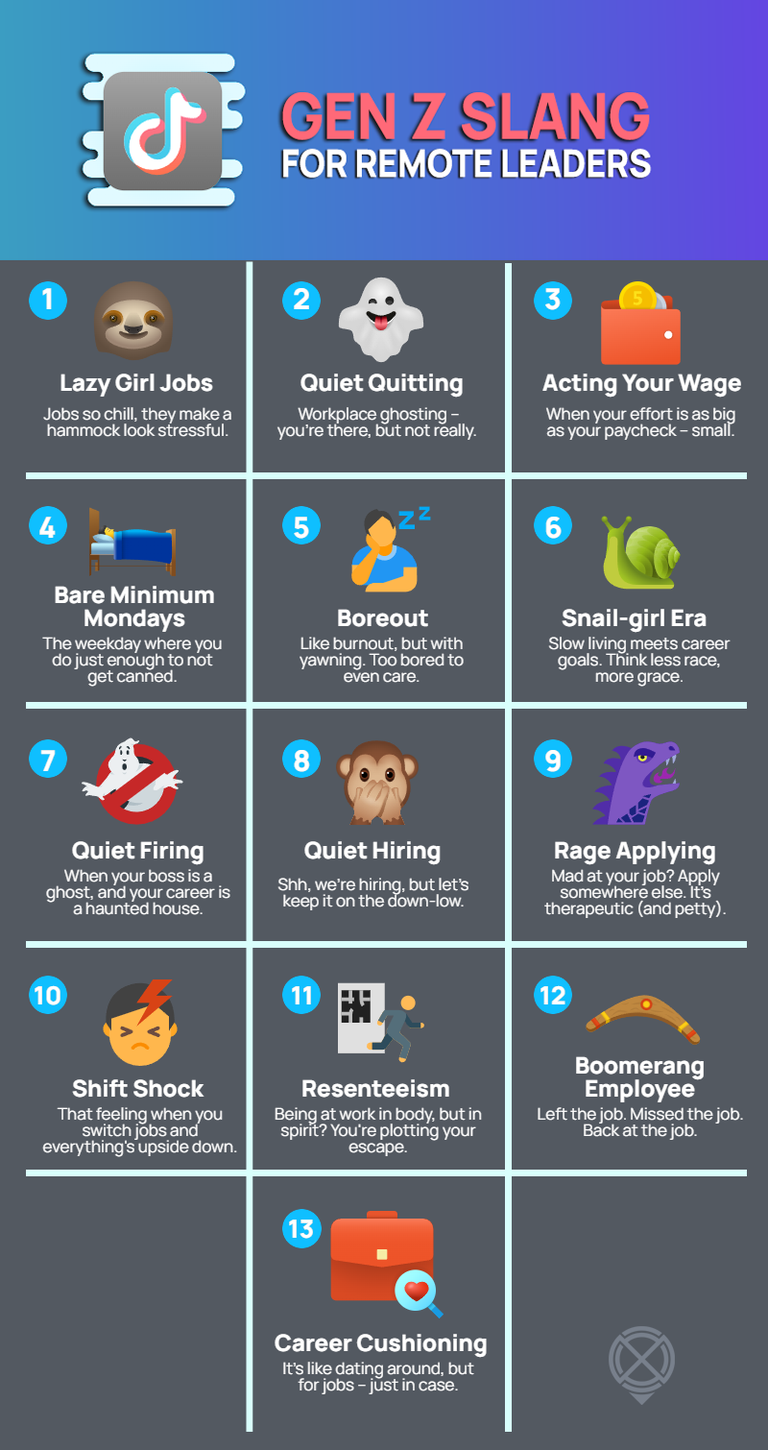Contents
- 1) Lazy Girl Jobs
- 2) Quiet Quitting
- 3) Acting Your Wage
- 4) Bare Minimum Mondays
- 5) Boreout
- 6) Snail-girl Era
- 7) Quiet Firing
- 8) Quiet Hiring
- 9) Rage Applying
- 10) Shift Shock
- 11) Resenteeism
- 12) Boomerang Employee
- 13) Career Cushioning
Gen Z TikTok slang is getting harder to understand every year – no cap. A creative blend of text speak, popular culture references and phrases created by TikTokers – we’re living in a new kind of lyrical age.
In the spirit of social connection, we thought it would be a good idea to revisit some of the terms you’re likely to hear in 2024.
After all, Gen Z slang isn’t just fun to know! It’s also a useful window into the shifting attitudes and practices of the modern workforce.
- 55% of Gen Z’s graduating this year want flexible work arrangements.
This article takes a light-hearted look at the cheeky language that Gen Z uses every day in the workplace.
By applying it to a remote work context, we start to see how Gen Z TikTok slang is influencing workplace culture.
Big on every remote leader’s priority list for 2024 – understanding their Gen Z workers.
Here’s a good start.

1) Lazy Girl Jobs
Jobs so chill, they make a hammock look stressful.
A lazy girl job is all about the dream of earning a good paycheck with minimal effort.
This sounds like a job that asks for your presence, not your genius. In remote work, being a virtual couch potato will turn your career into a very comfortable, very stagnant, couch.
In this instance though, lazy means easy and less time-consuming, not ‘poorly done.’
2) Quiet Quitting
Workplace ghosting – you’re there, but not really.
Quiet quitters do just enough to not get fired. In remote work, this can be a slippery slope to irrelevance.
Being out of sight shouldn't mean being out of ambition – otherwise career growth will quietly quit on them, too. If you suspect someone of being a quiet quitter, it’s best to address it.
3) Acting Your Wage
When your effort is as big as your paycheck – small.
Matching your effort with your pay seems perfectly logical. If you’re paying your workers well, then they should rise to the occasion.
If you’re not, this might be a term you hear tossed around virtual meetings. Fair pay – no matter where in the world your remote workers live – is always the goal.
4) Bare Minimum Mondays
The weekday where you do just enough to not get canned.
Starting the week with as little effort as humanly possible. James Clear would call this bad advice and a terrible habit worth breaking.
If someone on your team hates Mondays this much, chat to them about skipping it altogether and opting for a flexible four-day work week instead.
5) Boreout
Like burnout, but with yawning. Too bored to even care.
Have you ever been so bored you went numb? While less stressful than burnout, boreout is a big red flag if spotted in your remote workers.
It means they’re apathetic, disconnected and disengaged. That spells big trouble and a whole lot of below average work coming your way.
6) Snail-girl Era
Slow living meets career goals. Think less race, more grace.
Slowing down is part of work-life imbalance. But in this instance, the person isn’t going slower – they’re just prioritizing self-care over working too hard.
It’s a good thing, because it means their focus is on rebalancing so that they can still excel – it’s just not going to lead to burnout.
7) Quiet Firing
When your boss is a ghost, and your career is a haunted house.
Prepare to jump in with both feet if you ever hear the term ‘quiet firing.’ It’s used when someone’s manager or boss (you) isn’t mentoring them, guiding them, and supporting them in their careers.
Your remote worker might feel like you’re trying to force them to quit.
8) Quiet Hiring
Shh, we’re hiring, but let’s keep it on the down-low.
Sometimes this means hiring contract workers, which is awesome. Sometimes it means indirectly forcing an existing remote worker to do work beyond their job role – much less awesome.
Find out which one it is if you hear the term, and correct the misconception if there is one.
9) Rage Applying
Mad at your job? Apply somewhere else. It’s therapeutic (and petty).
Job hunting in a huff can result in people accidentally leaving your team. In this case, it’s a symptom of something not clicking in your remote work environment.
Are you overloading people? Has there been a communication break-down? Check in with your team and make sure no-one is raging.
10) Shift Shock
That feeling when you switch jobs and everything's upside down.
Sudden changes in a remote team can be disorienting. It’s your job to help disorientated new hires embrace flexibility, so that they don’t feel unstable and disconnected.
Don’t rush through the human bits – a big part of a job is getting to know the people you work with.
11) Resenteeism
Being at work in body, but in spirit? You're plotting your escape. escape
If your workers are physically present but mentally absent, it’s going to delay projects, and lead to shoddy, inconsistent work.
Make time to chat to team members about their work to see if they’re experiencing resenteeism – where they’re working with you, only because there’s no better option.
12) Boomerang Employee
Left the job. Missed the job. Back at the job.
On one hand rehiring someone that knows your company, processes and practices is great.
On the other they’re going to need time to catch up on what has changed since they left. If you’ve hired a boomerang employee, watch out for old tricks in the new pack.
13) Career Cushioning
It’s like dating around, but for jobs – just in case.
It’s wise to have a plan B, and nothing is forever these days. But if you hear the term ‘career cushioning’ your workers are talking about lining up potential jobs, in case yours doesn’t work out for them.
The one foot in, one foot out approach is okay... as long as both feet are in when it counts.
Sorrows, sorrows, prayers for those remote leaders who are suddenly realizing that their team needs an immediate meeting! It’s better to call one now and address these social issues.
While these Gen Z slang terms inject some humor into the remote workplace, they also highlight a growing trend of minimalism in effort and engagement. Nothing to worry about if you’re managing your team correctly and putting social connection high up on your priority list.
In the end, remote work thrives on a culture of engagement, innovation, and a bit of that old-school work ethic, sprinkled with the new-age wisdom of autonomous work-life balance.






